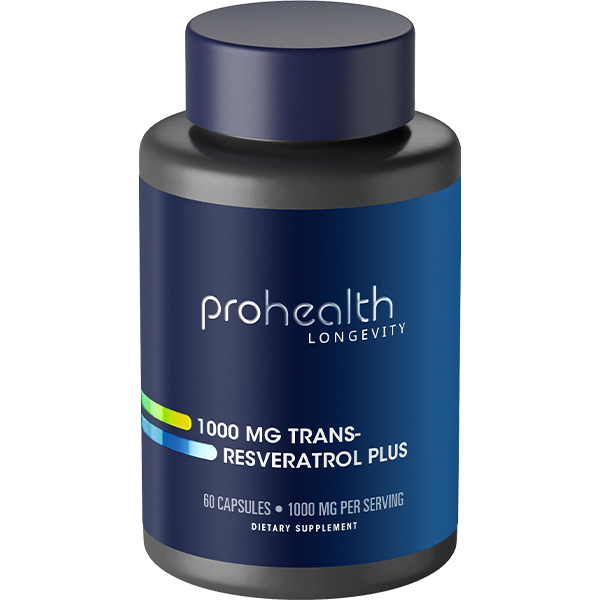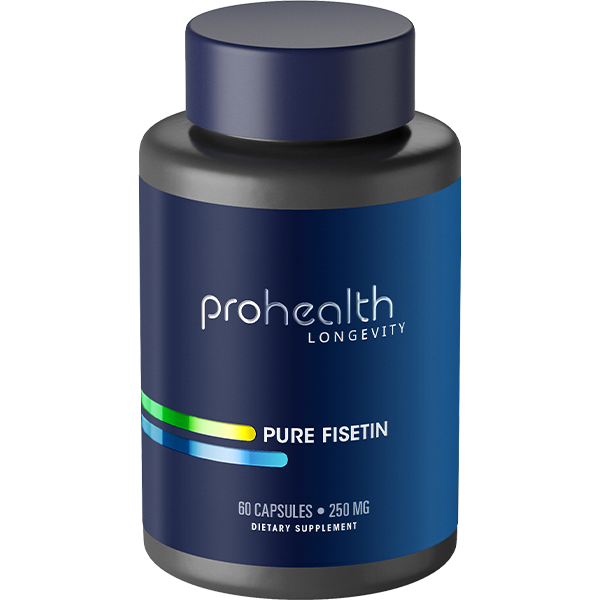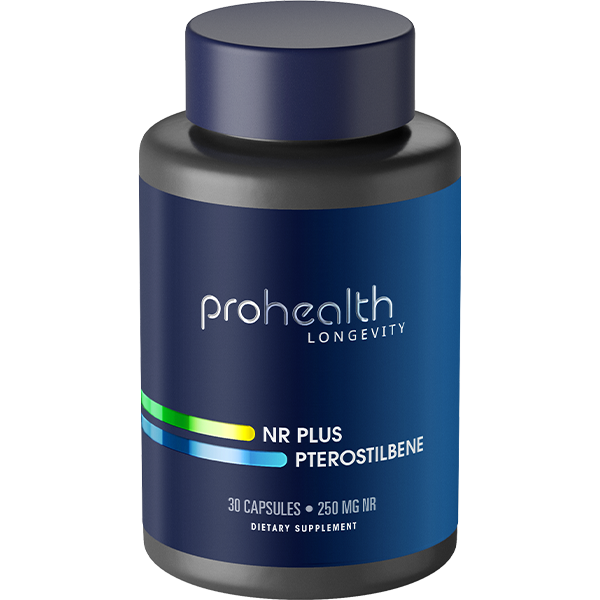LONGEVITY ARTICLES
5 Expert-Recommended Supplements for Longevity
by Heather Makar — December 15th, 2023

Contents
Studies have shown that a wide array of supplement can help reverse signs of aging. But which supplements have the most to offer? Today we’ll take a look at the benefits of popular bioactive supplements like NAD+ Boosters, Resveratrol, Apigenin, Ergothioneine, and Fisetin. Your doctor might not know about these supplements. Some scientists think they could be the answer to slow down aging. Research is unveiling natural compounds that can unlock your body's innate repair processes. These formulas will help you stay healthy and slow the decline that comes with aging. Cognitive loss, lack of energy, limited mobility, and reduced strength aren't inevitable. If you want to live longer, possibly much longer, these formulas are for you.
Longevity Articles — 5 Min Read
You might be tempted to reach for a second (or fifth) cup of coffee to jolt you into reality. Stimulants like coffee mask feelings of fatigue making you crash harder later. To have more real energy, your body has to become better at making it, which is where NAD+ comes in. NAD+ gives each of your cells the raw materials needed to turn your lunch into your next workout.
NAD+ levels decrease at a rate of about 1% per year, so by the time you're 50, you've got about half as much as when you were born. If you're lacking pep in your step, decreased NAD+ might be to blame. Taking precursor molecules such as NR, or Nicotinamide Riboside, has been shown to boost NAD+ levels in both human and animal models.
Increasing NAD+ levels with NR has been proposed as a strategy for supporting cardiovascular health in aging adults. Research showed that adults who took 1,000 mg of NR per day for six weeks had reduced blood pressure. Specifically, people with elevated blood pressure had a reduction in average systolic blood pressure after taking NR compared to the placebo.
NR had positive effects on risk factors for age-related cardiovascular events, such as aortic stiffness. This is especially important as the increase in cardiovascular risk with aging may be driven largely by adverse changes to arteries, including stiffening of the aorta, and by increases in systolic blood pressure.
Resveratrol is famously found in grape skins, so it makes its way into your favorite bottle of wine. The amount of resveratrol in your glass is unfortunately so small it's basically useless. Some researchers have been known to take over a gram, that's 1000 mg, per day of this nearly white powder, and here's why.
Dr. Joseph Baur, a professor at the University of Pennsylvania, is a leading researcher in the field of resveratrol and aging. His work has been pivotal in understanding how resveratrol influences various aspects of aging. Dr. Baur's research delves into how resveratrol can potentially slow down certain aging processes and enhance cellular function. He investigates the cellular mechanisms affected by resveratrol, suggesting that it can support healthier, more resilient cells as we age.
Another significant contributor to resveratrol research is Dr. Rafael deCabo at the National Institute on Aging. Dr. de Cabo's studies focus on the compound's ability to mimic the effects of calorie restriction. He’s noted significant effects in mitochondrial health, a known factor in promoting a longer lifespan. His research underscores the potential of resveratrol to contribute significantly to cardiovascular health and overall wellness, key elements in aging well.
If you enjoy a hot mug of chamomile tea or eat your favorite dip with celery, you're already getting a hint of apigenin in your diet. Never heard of it? You're not alone, and that's because it's only recently making waves. It's a compound that can help extend healthy human lifespan, thanks to these experts.
Several researchers spanning the globe collaborated to illuminate apigenin’s impact on brain health. They show this flavonoid has the potential to support cognitive functions and mental well-being. This makes it a powerful addition to your supplement stack.
Dr. Jeremy Spencer, a renowned figure in the field of dietary flavonoids, has explored the broader benefits of apigenin on the body. His work demonstrates how this compound can contribute to the maintenance of overall health. It has the potential to support cellular functions and combat the stresses of aging.
Apigenin works its magic by engaging with our body’s natural healing processes. The collaborative research highlights its ability to work on the brain. This can help you maintain focus and memory into older age. Dr. Spencer’sstudies have shown that apigenin can support immunity.
The beauty of apigenin lies in its simplicity and accessibility. Researchers like Dr. Spencer will continue to unravel its benefits. It's becoming clear that this flavonoid holds a key to supporting our health naturally.
Ergothioneine, a lesser-known but incredibly potent amino acid, is a game-changer for longevity. Ergothioneine provides your cells with tools to repair themselves. It's not that common in most diets. This rare nutrient is in mushrooms and a few other things. But, it's present in such small quantities you'd have to eat nothing but mushrooms all day to see any benefits.
Dr. Robert Beelman, Professor Emeritus of Food Science at Penn StateUniversity, is an outspoken advocate for ergothioneine. He's been studying this compound and believes it's crucial for maintaining good health as we age. His research points out that ergothioneine acts like a cellular bodyguard. Itprotects our cells from damage and keeps them healthy and robust.
The remarkable thing about ergothioneine, as Dr. Beelman’s research shows, is its ability to accumulate in the body where it's most needed, like areas prone to high oxidative stress. This means that ergothioneine can target the areas that need it the most, like your heart and your brain.
Dr. Bruce Ames is a senior scientist at Children's Hospital Oakland ResearchInstitute. He has spent a good deal of time studying how our bodies cope with aging. He believes that ergothioneine could be a key piece of the puzzle in slowing down the aging process. It has strong antioxidant properties. This helps fend off the stress and damage that our cells face daily.
Dr. Ames’ studies suggest that regular consumption of ergothioneine-rich foods can maintain cellular health. Ergothioneine can help cells age slower and preserve our health longer.
Fisetin, a flavonoid found in many fruits and vegetables, might be the unsung hero in the world of longevity.
Dr. Pamela Maher, a leading researcher at the Salk Institute for BiologicalStudies, is a pioneer in fisetin research. Her groundbreaking work has highlighted fisetin's ability to protect brain health and longevity. Dr. Maher's studies suggest that fisetin helps in maintainingcognitive functions as we age. It helps reduce the impacts of age-related stress and damage on brain cells.
Dr. Paul Robbins from the Scripps Research Institute deepens ourunderstanding of fisetin. He shows how this flavonoid can act as a powerful agent in combatting the degenerative processes that come with aging. According to Dr. Robbins, fisetin is particularly effective in flushing out cells that no longer function properly. This process is crucial for maintaining overall cellular health.
Fisetin helps to clear out "zombie" cells, senescent cells thatonly partially function. These zombie cells interfere with the function ofother cells around them.
The beauty of fisetin, as Dr. Maher's research shows, lies in its relatively clear mechanisms. Meanwhile, Dr. Robbins' studies highlight its potential as a potent supporter of the body's natural regenerative process.
Summary
Fisetin, a flavonoid found in many fruits and vegetables, might be the unsung hero in the world of longevity.
Dr. Pamela Maher, a leading researcher at the Salk Institute for BiologicalStudies, is a pioneer in fisetin research. Her groundbreaking work has highlighted fisetin's ability to protect brain health and longevity. Dr. Maher's studies suggest that fisetin helps in maintaining cognitive functions as we age. It helps reduce the impacts of age-related stress and damage on brain cells.
Dr. Paul Robbins from the Scripps Research Institute deepens our understanding of fisetin. He shows how this flavonoid can act as a powerful agent in combatting the degenerative processes that come with aging. According to Dr. Robbins, fisetin is particularly effective in flushing out cells that no longer function properly. This process is crucial for maintaining overall cellular health.
Fisetin helps to clear out "zombie" cells, senescent cells thatonly partially function. These zombie cells interfere with the function ofother cells around them.
Sources
1. Trammell, S. et al. Nicotinamide riboside is uniquely and orally bioavailable in mice and humans. Nature communications, 7, 12948. 2016. https://doi.org/10.1038/ncomms12948
2. Martens, C.R. et al. Chronic nicotinamide riboside supplementation is well-tolerated and elevates NAD+ in healthy middle-aged and older adults. Nature Communiations, 9, 1286 2018. https://doi.org/10.1038/s41467-018-03421-7
3. Baur JA, Sinclair DA. Therapeutic potential of resveratrol: the in vivoevidence. Nat Rev Drug Discov. 2006;5(6):493-506. doi:10.1038/nrd2060
4. Ungvari Z, Sonntag WE, de Cabo R, Baur JA, Csiszar A. Mitochondrialprotection by resveratrol. Exerc Sport Sci Rev. 2011;39(3):128-132.doi:10.1097/JES.0b013e3182141f80
5. Nabavi SF, Khan H, D’onofrioG, et al. Apigenin as neuroprotective agent: Of mice and men. PharmacologicalResearch. 2018;128:359-365. doi:10.1016/j.phrs.2017.10.008
6. Salehi B, Mishra AP, Nigam M,et al. Resveratrol: a double-edged sword in health benefits. Biomedicines.2018;6(3):91. doi:10.3390/biomedicines6030091
7. Beelman RB, Kalaras MD, Phillips AT, Richie JP. Is ergothioneine a“longevity vitamin” limited in the American diet? J Nutr Sci.2020;9:e52. doi:10.1017/jns.2020.44
LONGEVITY ARTICLES
5 Expert-Recommended Supplements for Longevity
by Heather Makar — December 15th, 2023

Contents
Studies have shown that a wide array of supplement can help reverse signs of aging. But which supplements have the most to offer? Today we’ll take a look at the benefits of popular bioactive supplements like NAD+ Boosters, Resveratrol, Apigenin, Ergothioneine, and Fisetin. Your doctor might not know about these supplements. Some scientists think they could be the answer to slow down aging. Research is unveiling natural compounds that can unlock your body's innate repair processes. These formulas will help you stay healthy and slow the decline that comes with aging. Cognitive loss, lack of energy, limited mobility, and reduced strength aren't inevitable. If you want to live longer, possibly much longer, these formulas are for you.
You might be tempted to reach for a second (or fifth) cup of coffee to jolt you into reality. Stimulants like coffee mask feelings of fatigue making you crash harder later. To have more real energy, your body has to become better at making it, which is where NAD+ comes in. NAD+ gives each of your cells the raw materials needed to turn your lunch into your next workout.
NAD+ levels decrease at a rate of about 1% per year, so by the time you're 50, you've got about half as much as when you were born. If you're lacking pep in your step, decreased NAD+ might be to blame. Taking precursor molecules such as NR, or Nicotinamide Riboside, has been shown to boost NAD+ levels in both human and animal models.
Increasing NAD+ levels with NR has been proposed as a strategy for supporting cardiovascular health in aging adults. Research showed that adults who took 1,000 mg of NR per day for six weeks had reduced blood pressure. Specifically, people with elevated blood pressure had a reduction in average systolic blood pressure after taking NR compared to the placebo. NR had positive effects on risk factors for age-related cardiovascular events, such as aortic stiffness. This is especially important as the increase in cardiovascular risk with aging may be driven largely by adverse changes to arteries, including stiffening of the aorta, and by increases in systolic blood pressure.
Resveratrol is famously found in grape skins, so it makes its way into your favorite bottle of wine. The amount of resveratrol in your glass is unfortunately so small it's basically useless. Some researchers have been known to take over a gram, that's 1000 mg, per day of this nearly white powder, and here's why.
Dr. Joseph Baur, a professor at the University of Pennsylvania, is a leading researcher in the field of resveratrol and aging. His work has been pivotal in understanding how resveratrol influences various aspects of aging. Dr. Baur's research delves into how resveratrol can potentially slow down certain aging processes and enhance cellular function. He investigates the cellular mechanisms affected by resveratrol, suggesting that it can support healthier, more resilient cells as we age.
Another significant contributor to resveratrol research is Dr. Rafael deCabo at the National Institute on Aging. Dr. de Cabo's studies focus on the compound's ability to mimic the effects of calorie restriction. He’s noted significant effects in mitochondrial health, a known factor in promoting a longer lifespan. His research underscores the potential of resveratrol to contribute significantly to cardiovascular health and overall wellness, key elements in aging well.
If you enjoy a hot mug of chamomile tea or eat your favorite dip with celery, you're already getting a hint of apigenin in your diet. Never heard of it? You're not alone, and that's because it's only recently making waves. It's a compound that can help extend healthy human lifespan, thanks to these experts.
Several researchers spanning the globe collaborated to illuminate apigenin’s impact on brain health. They show this flavonoid has the potential to support cognitive functions and mental well-being. This makes it a powerful addition to your supplement stack.
Dr. Jeremy Spencer, a renowned figure in the field of dietary flavonoids, has explored the broader benefits of apigenin on the body. His work demonstrates how this compound can contribute to the maintenance of overall health. It has the potential to support cellular functions and combat the stresses of aging.
Apigenin works its magic by engaging with our body’s natural healing processes. The collaborative research highlights its ability to work on the brain. This can help you maintain focus and memory into older age. Dr. Spencer’sstudies have shown that apigenin can support immunity.
The beauty of apigenin lies in its simplicity and accessibility. Researchers like Dr. Spencer will continue to unravel its benefits. It's becoming clear that this flavonoid holds a key to supporting our health naturally.
Ergothioneine, a lesser-known but incredibly potent amino acid, is a game-changer for longevity. Ergothioneine provides your cells with tools to repair themselves. It's not that common in most diets. This rare nutrient is in mushrooms and a few other things. But, it's present in such small quantities you'd have to eat nothing but mushrooms all day to see any benefits.
Dr. Robert Beelman, Professor Emeritus of Food Science at Penn StateUniversity, is an outspoken advocate for ergothioneine. He's been studying this compound and believes it's crucial for maintaining good health as we age. His research points out that ergothioneine acts like a cellular bodyguard. Itprotects our cells from damage and keeps them healthy and robust.
The remarkable thing about ergothioneine, as Dr. Beelman’s research shows, is its ability to accumulate in the body where it's most needed, like areas prone to high oxidative stress. This means that ergothioneine can target the areas that need it the most, like your heart and your brain.
Dr. Bruce Ames is a senior scientist at Children's Hospital Oakland ResearchInstitute. He has spent a good deal of time studying how our bodies cope with aging. He believes that ergothioneine could be a key piece of the puzzle in slowing down the aging process. It has strong antioxidant properties. This helps fend off the stress and damage that our cells face daily.
Dr. Ames’ studies suggest that regular consumption of ergothioneine-rich foods can maintain cellular health. Ergothioneine can help cells age slower and preserve our health longer.
Fisetin, a flavonoid found in many fruits and vegetables, might be the unsung hero in the world of longevity.
Dr. Pamela Maher, a leading researcher at the Salk Institute for BiologicalStudies, is a pioneer in fisetin research. Her groundbreaking work has highlighted fisetin's ability to protect brain health and longevity. Dr. Maher's studies suggest that fisetin helps in maintainingcognitive functions as we age. It helps reduce the impacts of age-related stress and damage on brain cells.
Dr. Paul Robbins from the Scripps Research Institute deepens ourunderstanding of fisetin. He shows how this flavonoid can act as a powerful agent in combatting the degenerative processes that come with aging. According to Dr. Robbins, fisetin is particularly effective in flushing out cells that no longer function properly. This process is crucial for maintaining overall cellular health.
Fisetin helps to clear out "zombie" cells, senescent cells thatonly partially function. These zombie cells interfere with the function ofother cells around them.
The beauty of fisetin, as Dr. Maher's research shows, lies in its relatively clear mechanisms. Meanwhile, Dr. Robbins' studies highlight its potential as a potent supporter of the body's natural regenerative process.
Summary
Fisetin, a flavonoid found in many fruits and vegetables, might be the unsung hero in the world of longevity.
Dr. Pamela Maher, a leading researcher at the Salk Institute for BiologicalStudies, is a pioneer in fisetin research. Her groundbreaking work has highlighted fisetin's ability to protect brain health and longevity. Dr. Maher's studies suggest that fisetin helps in maintaining cognitive functions as we age. It helps reduce the impacts of age-related stress and damage on brain cells.
Dr. Paul Robbins from the Scripps Research Institute deepens our understanding of fisetin. He shows how this flavonoid can act as a powerful agent in combatting the degenerative processes that come with aging. According to Dr. Robbins, fisetin is particularly effective in flushing out cells that no longer function properly. This process is crucial for maintaining overall cellular health.
Fisetin helps to clear out "zombie" cells, senescent cells thatonly partially function. These zombie cells interfere with the function ofother cells around them.
Sources
1. Trammell, S. et al. Nicotinamide riboside is uniquely and orally bioavailable in mice and humans. Nature communications, 7, 12948. 2016. https://doi.org/10.1038/ncomms12948
2. Martens, C.R. et al. Chronic nicotinamide riboside supplementation is well-tolerated and elevates NAD+ in healthy middle-aged and older adults. Nature Communiations, 9, 1286 2018. https://doi.org/10.1038/s41467-018-03421-7
3. Baur JA, Sinclair DA. Therapeutic potential of resveratrol: the in vivoevidence. Nat Rev Drug Discov. 2006;5(6):493-506. doi:10.1038/nrd2060
4. Ungvari Z, Sonntag WE, de Cabo R, Baur JA, Csiszar A. Mitochondrialprotection by resveratrol. Exerc Sport Sci Rev. 2011;39(3):128-132.doi:10.1097/JES.0b013e3182141f80
5. Nabavi SF, Khan H, D’onofrioG, et al. Apigenin as neuroprotective agent: Of mice and men. PharmacologicalResearch. 2018;128:359-365. doi:10.1016/j.phrs.2017.10.008
6. Salehi B, Mishra AP, Nigam M,et al. Resveratrol: a double-edged sword in health benefits. Biomedicines.2018;6(3):91. doi:10.3390/biomedicines6030091
7. Beelman RB, Kalaras MD, Phillips AT, Richie JP. Is ergothioneine a“longevity vitamin” limited in the American diet? J Nutr Sci.2020;9:e52. doi:10.1017/jns.2020.44
Longevity Articles — 5 Min Read

















